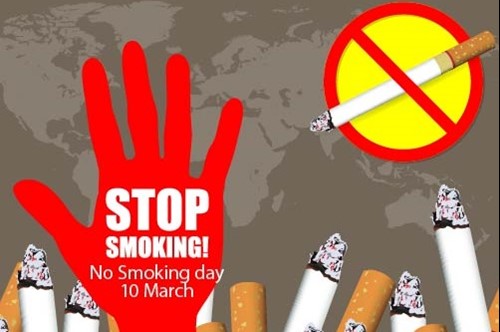It’s No Smoking day on 10 March. What can employers do to support workers to quit?
Features
Turn smoking to ash
Ron has stories that will make your hair stand on end. An ex-builder, in the late ‘90s he worked on some high-risk projects, including building a sewer-network many metres under Brighton beach.
Most of his colleagues were smokers and used to hide their cigarettes beneath cupped hands.
 It’s No Smoking day on 10 March. What can employers do to support workers to quit? Image: iStock
It’s No Smoking day on 10 March. What can employers do to support workers to quit? Image: iStock
Smoking was not just against the rules but highly risky, in more ways than one. Tunnelling underground can release pockets of the gas methane, an explosive. Lighting up could have literally been fatal. “Their addiction and their love of smoking overrode the risks they were perfectly well aware of. That is the difficulty of how you get people to change what they do,” says Ron.
You might think that smoking and smoking at work has changed a lot since then. Smoking in enclosed workplaces has been banned since 2007 in England, and overall levels of smoking continue to decrease in the UK.
But still, smoking remains high among manual and construction workers. According to the Office for National Statistics (ONS), around a quarter, or one in four (23.4 per cent) of people in routine and manual occupations smoked in 2019, which is 2.5 times higher than people in managerial and professional occupations (9.3 per cent).
The government, through their tobacco control plan for England (2017), recognises that the UK must “reduce the inequality gap in smoking prevalence”. By 2022, it wants to create the first smokefree generation, to stop young people starting smoking and break the cycle that is predominantly affecting low income groups and manual trades. Local councils and health bodies have been asked to take ‘focused action’ on helping these most vulnerable groups.
No Smoking Day on 10 March is a good opportunity to look at what we can all do to help, especially employers who are in a position and have a duty to look after their workers’ health.
Many employers encourage staff to quit smoking by sharing information on the health benefits of giving up, while giving space for people to continue if they wish.
Paul Johnson, group HSEQ director at Carey Group, says: “We continue to push free NHS guidance on stop smoking, but still provide smoking shelters and time for people to have smoking breaks during the day.” Smoke Free NHS is a free programme with facts, an app and ‘personal quit’ plans.
A few years ago, while completing the works to redevelop Birmingham New Street Station, construction firm Mace offered on-site lunchtime health clinics for all 1,000 of its construction workers. It was a partnership with Birmingham Community Healthcare NHS Trust’s stop smoking service.
As well as giving assistance for minor health and medical issues, an occupational health nurse would offer preventative advice about quitting smoking and adopting healthier lifestyles. Around 100 workers accessed the service. Out of these, 50 had managed to stay tobacco-free for at least four weeks.
When it comes to e-cigarettes the jury is still out on whether they are a health risk, although they can help people quit smoking.
The TUC says that separate areas should be made available for users of electronic cigarettes away from any outside smoking area. “If a worker is using electronic cigarettes to help them give up smoking tobacco then it is not going to help forcing them to go outside in the same area as smokers,” says its guide to ensuring smokefree workplaces.
 'Charlie carrot' says no to smoking: Poster image from British Safety Council's archive
'Charlie carrot' says no to smoking: Poster image from British Safety Council's archive
E-cigarettes should be treated with caution however. Giving a lecture on lung cancer on 12 February 2020 for Gresham College, Professor Chris Whitty said: “We will not know for many years if they are dangerous or not.”
Finally, Allen Carr’s Easyway is a popular stop smoking programme. It doesn’t focus on the negative or use shock tactics, but gets would-be quitters to see the experience of giving up itself as positive.
Online training videos are intense, offered in four parts over several hours and it’s recommended that they are watched at once or over two days. Nuffield Health signed up to Allen Carr seminars for its staff at Brighton Hospital, and says that at least 50 per cent of those who attended were nicotine free after three months.
Construction workers work in cold weather, they can face stress and irregular income. Finally, in Ron’s view these are the issues that need addressing as smoking’s root causes.
NHS https://www.nhs.uk/smokefree.com
PHE stop smoking resources here
FEATURES

How to mitigate the hearing loss cost escalation tsunami
By Peter Wilson, Industrial Noise and Vibration Centre (INVC) on 06 February 2026
Employers need to adopt the latest and most effective noise risk evaluation and management measures, or face rapidly-rising compensation claims for noise-induced hearing loss at work.

Young drivers and work-related road risk: why employers must act now
By Simon Turner, Driving for Better Business on 06 February 2026
Young drivers have a higher risk of being involved in road collisions due to factors such as their inexperience, so when employing them to drive for work, it is vital they receive the right support to help them grow into safe professionals behind the wheel.

Financial stress: why and how it affects workplace safety
By Chloe Miller, freelance writer on 06 February 2026
Financial worries can lead to cognitive impairment that increases the risk of workplace accidents, so it’s essential employers provide financial education and confidential support for workers who may be struggling with problems like debt and unexpected living expenses.



